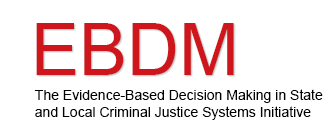EBDM Starter Kit
EBDM Starter Kit Introduction
The Evidence-Based Decision Making (EBDM) in Local Criminal Justice Systems Starter Kit provides guidance to jurisdictions interested in implementing the EBDM Framework. The Starter Kit outlines a planning process that is informed by the experiences of the seven EBDM sites that participated in Phase II of the EBDM initiative.
Purpose of the Starter Kit
The Starter Kit is intended to help collaborative criminal justice policy teams build their capacity to engage in EBDM. It follows the EBDM “Roadmap,” a step-by-step process designed to assist local jurisdictions in preparing to implement the EBDM Framework.
Who Should Use the Starter Kit
What Do We Mean By “Reducing Harm”?
“Harm reduction,” as used here, refers to decreases in the ill effects of crime experienced broadly by communities, by victims, by citizens, by families of offenders, and by offenders themselves.
The Starter Kit is designed for use by multidisciplinary criminal justice teams that have read and agreed to the basic premises of the Framework for Evidence-Based Decision Making in Local Criminal Justice Systems and that are committed to working together toward a justice system based on local data and empirical research. The team’s ultimate goal would be to achieve a reduction in the likelihood of pretrial misconduct, post-sentence reoffense, and other forms of community harm.
The Roadmap: Getting from Here to There
While the planning for the implementation of EBDM will not look the same across all local systems, the EBDM Starter Kit outlines a common, core set of activities designed to encourage or advance system alignment; system alignment is an essential foundation for EBDM. These core activities make up the EBDM Roadmap:
- Build a genuine, collaborative policy team.
- Build individual agencies that are collaborative and in a state of readiness for change.
- Understand current practice within each agency and across the system.
- Understand and have the capacity to implement evidence-based practices.
- Develop logic models.
- Establish performance measures, determine outcomes, and develop a system scorecard.
- Engage and gain the support of a broader set of stakeholders and the community.
- Develop a strategic action plan for implementation.
A number of smaller steps are suggested under each core activity. To download a chart that summarizes these steps, click here.
It is important to note that these activities and steps typically do not occur in a linear fashion. Instead, teams should expect that they will conduct a number of activities concurrently, or they may need to revisit activities that have already been completed as a result of new learnings. You might say that there is not just one road, but many roads that lead to the final destination, and each team may take a different route to get there.
To begin the Roadmap, click here, or select one of the specific, core Roadmap activities in the navigation bar to the left.
Additional Resources
Other products are available to supplement the EBDM Framework and the EBDM Starter Kit. User’s Guides specifically developed for defense attorneys, judges, pretrial justice professionals, and prosecutors will become available in 2012. The User’s Guides will summarize key research findings and describe the potential implications of EBDM for these disciplines.

